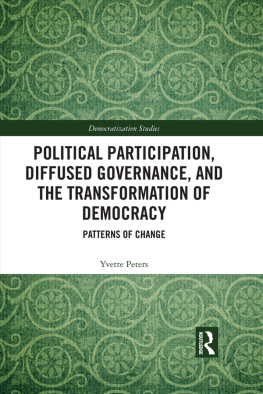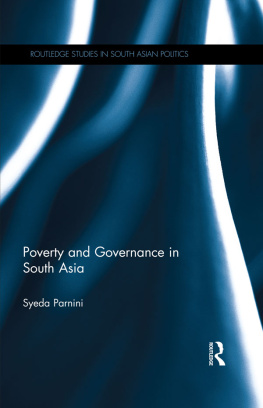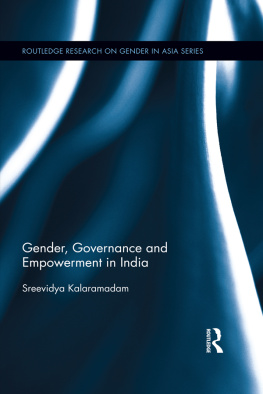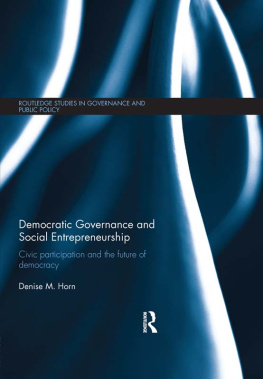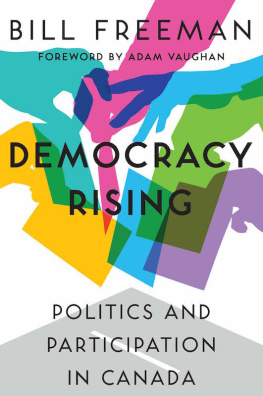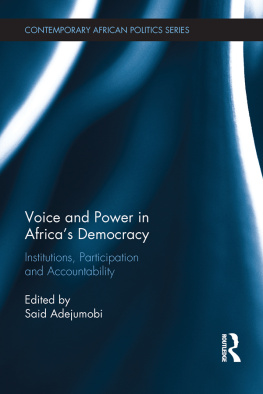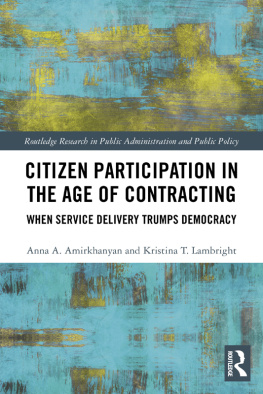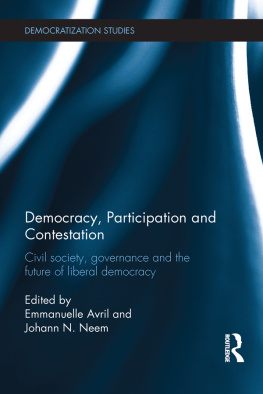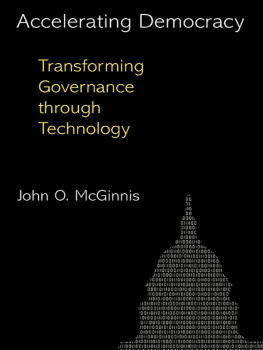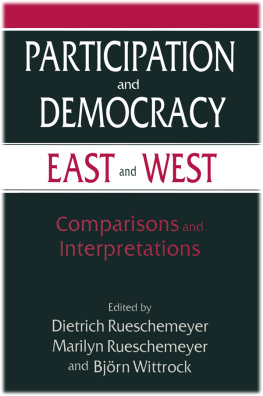Political Participation, Diffused Governance, and the Transformation of Democracy
Although democratic governments have introduced a number of institutional reforms in part intended to increase citizens political involvement, studies show a continued decline in regular political engagement. This book examines different forms of political participation in democracies, and in what ways the delegation of public responsibilities or, the diffusion of politics has affected patterns of participation since the 1980s.
The book addresses this paradox by directly investigating the impact of institutional changes on citizens political participation empirically. It re-analyses patterns of political participation in contemporary democracies, providing an in-depth time series cross-sectional analysis that helps develop a better understanding of how variation in political participation can be explained, both between countries and over time. As such, it develops an institutional theoretical framework which can help to explain levels of participation and shows that, instead of displaying more political apathy, citizens have reallocated or displaced their activities to a broader array of forms of participation.
This book will be of key interest to students and scholars of comparative politics, democratization, political participation, and electoral politics.
Yvette Peters is a Researcher at the University of Bergen, Norway, and has been Assistant Professor at the Humboldt University of Berlin, Germany, before that.
Democratization Studies
(Formerly Democratization Studies, Frank Cass)
For more information about this series, please visit: www.routledge.com/Democratization-Studies/book-series/DS
Democratization Studies combines theoretical and comparative studies with detailed analyses of issues central to democratic progress and its performance, all over the world.
The books in this series aim to encourage debate on the many aspects of democratization that are of interest to policy-makers, administrators and journalists, aid and development personnel, as well as to all those involved in education.
32 Democratization in EU Foreign Policy
New Member States as Drivers of Democracy Promotion
Edited by Benedetta Berti, Kristina Mikulova and Nicu Popescu
33 Democratization in the 21st Century
Reviving Transitology
Edited by Mohammad-Mahmoud Ould Mohamedou and Timothy D. Sisk
34 Democratizing Public Governance in Developing Nations
With Special Reference to Africa
Edited by M. Shamsul Haque, Anastase Shyaka, and Gedeon M. Mudacumura
35 Political Participation, Diffused Governance, and the Transformation of Democracy
Patterns of Change
Yvette Peters
36 When Democracies Collapse
Assessing Transitions to Non-Democratic Regimes in the Contemporary World
Luca Tomini
First published 2018
by Routledge
2 Park Square, Milton Park, Abingdon, Oxon OX14 4RN
and by Routledge
711 Third Avenue, New York, NY 10017
Routledge is an imprint of the Taylor & Francis Group, an informa business
2018 Yvette Peters
The right of Yvette Peters to be identified as author of this work has been asserted by her in accordance with sections 77 and 78 of the Copyright, Designs and Patents Act 1988.
All rights reserved. No part of this book may be reprinted or reproduced or utilised in any form or by any electronic, mechanical, or other means, now known or hereafter invented, including photocopying and recording, or in any information storage or retrieval system, without permission in writing from the publishers.
Trademark notice: Product or corporate names may be trademarks or registered trademarks, and are used only for identification and explanation without intent to infringe.
British Library Cataloguing-in-Publication Data
A catalogue record for this book is available from the British Library
Library of Congress Cataloging-in-Publication Data
A catalog record for this title has been requested
ISBN: 978-1-138-23999-9 (hbk)
ISBN: 978-1-315-29449-0 (ebk)
Typeset in Times New Roman
by Apex CoVantage, LLC
To John and Carla, my parents, without whom nothing would have been possible.
Contents
PART 1
The changing democratic system
PART 2
Patterns of participation: the impact of competence diffusion
PART 3
Democracy at the crossroads? Some conclusions
The idea for the study reported here came a little more than decade ago, when I was still a student at the University of Leiden. It started with an interest in political participation, and in wanting to understand what can account for such differences in levels of participation. The idea further developed because a puzzle struck me: while participation is different in different countries, it seemed that there were some very similar trends in the development of the levels of participation. More specifically, I became fascinated by Peter Mairs somewhat pessimistic views of the development of democracy based on some of these changes. He claimed that political parties were in decline, and with that, democracy was not developing in a way that would strengthen it. At that moment, I was a little surprised by these conclusions: while I could also see a decline in the use of institutionalised forms of participation, and could see that the popular character of political parties was in decline, I also saw that people were far from apathetic. They still demonstrated or signed petitions, and seemed to still be quite active in politics. Mairs later conclusion that citizens were taking themselves out of the democratic equation was something that I simply could not match with the figures that I saw. I thus further pursued this fascination, the inability of matching Mairs conclusions with some of the data on participation, and wanted to study the relation between political participation and political institutions, including different forms of participation and democracy. In the process, I might have become more pessimistic (but also still hopeful) about the health of democracy than Peter was before he tragically passed away in the summer of 2011.
This book does not try to assess the current state of democracy in a normative way per se, perhaps tries to specifically not do that, even though it came out of this puzzle of the argued crisis of democracy and the seemingly flourishing popular participation in them. Rather, it is an attempt to better understand how peoples involvement in politics and the structure of the political system interact. In other words, what the demos and the kratos in democracy look like, and how they relate.
While writing a book can in some way be a lonely experience, it is at the same time an experience so many people are a part of. There are many people who have helped me in different ways throughout the years. They helped me to do the research reported here, but have also helped me in so many ways to become a better researcher. I am very grateful for this help, and would like to take a moment to thank some of the people who were very important to me in the process of writing this book.
I want to start by thanking Alexander Trechsel. I was very fortunate to have his extensive support, feedback, and motivation. I am so thankful for his continued support; he has helped me to develop my ideas and to gather data and test my theory by continuously giving me constructive feedback, sharing his expertise, giving me new ideas and suggestions, helping out when there were problems, and just generally being supportive throughout the process. He has greatly contributed to the making of this book from start to finish. I would also like to thank Peter Mair. He, too, has been very supportive during my time at both Leiden and the EUI, and has been an enormous source of inspiration to me. Even today, six years after his passing away, his work remains important and inspiring. I know I do not speak for myself only when I say that I miss him.

